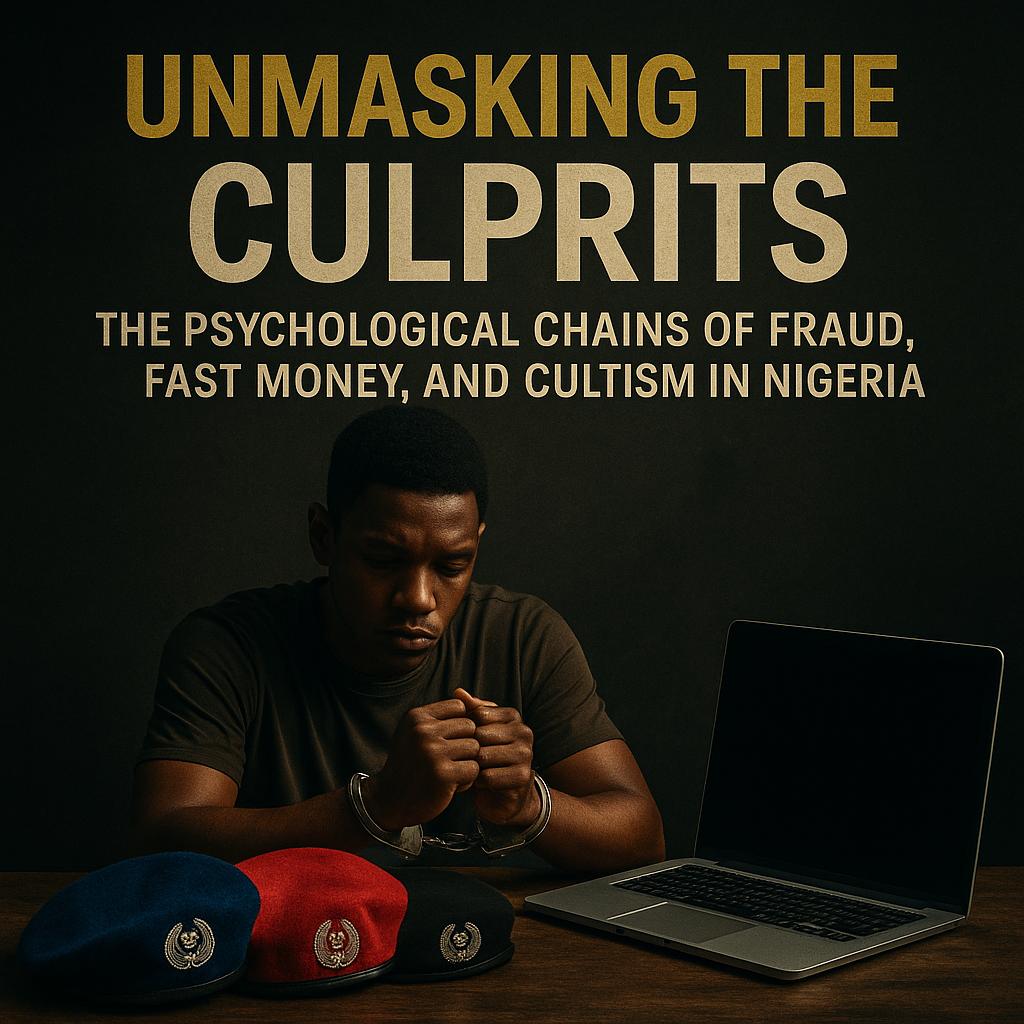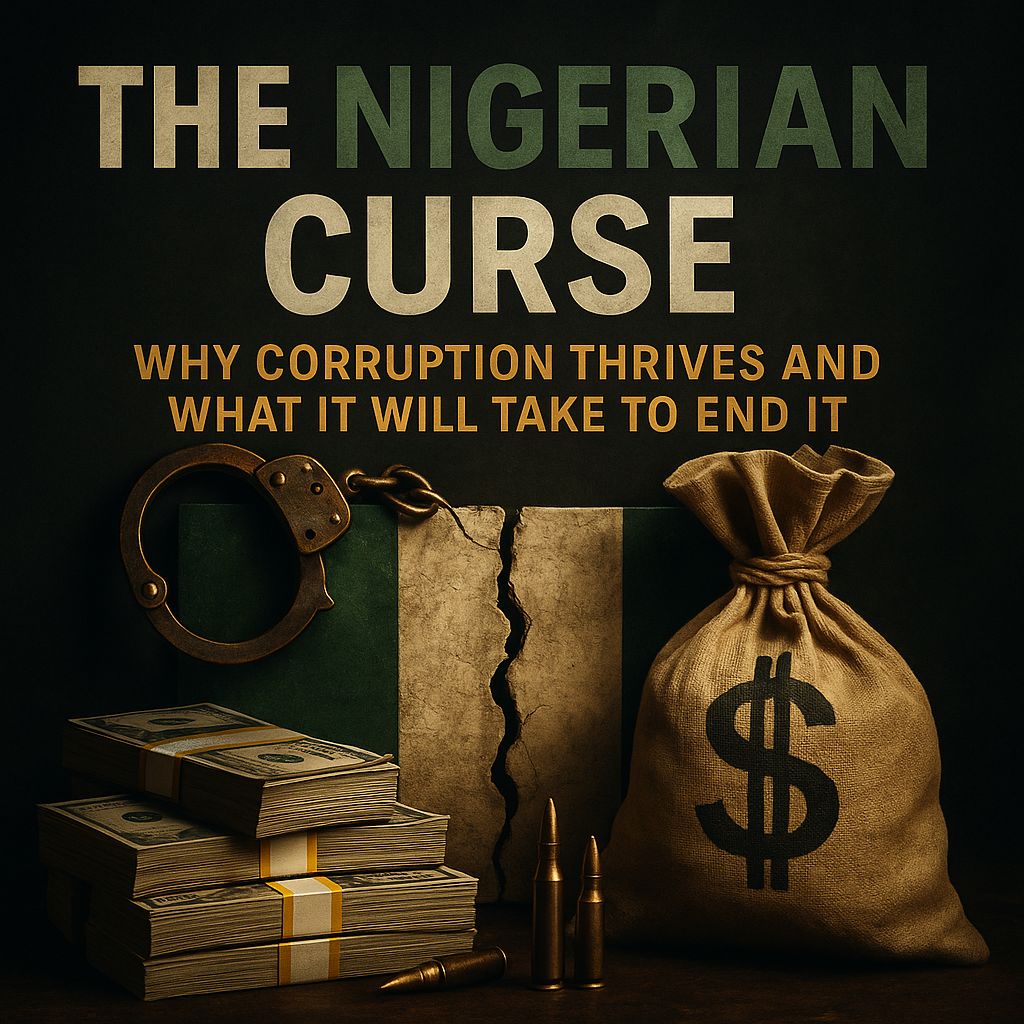Unmasking the Culprits: The Psychological Chains of Fraud, Fast Money, and Cultism in Nigeria
Introduction
Nigeria’s struggle against corruption and underdevelopment is not only a battle against corrupt leaders, but also against insidious vices among the youth. The Patriotic Voice holds that endemic cybercrime (fast money scams) and violent cultism are complicit in Nigeria’s failure. These activities don’t just harm society directly – they shackle the moral authority and courage of young Nigerians, leaving them less able to demand accountability from others. In effect, when youths indulge in fraud or cultism, they become both victims and enablers of the corrupt status quo. Studies have noted an alarming collapse of values in Nigeria, where the line between the crimes of internet scammers and the misconduct of so-called elites is blurred. In such an environment, involvement in crime can seem normal, but it silences the voice of youth conscience. The Patriotic Voice’s stance is clear: to save Nigeria’s future, we must expose and break these psychological chains of complicity.
The Anatomy of Fraud and Fast Money Schemes
Fraudulent schemes – from 419 scams to high-tech cybercrimes – have become widespread in Nigeria’s pursuit of quick riches. Nigeria now ranks number one in Africa for online scam threats and saw a staggering 174 percent increase in cybercrimes in just six months of 2022. This fast money epidemic is manifested through various schemes:
- Advance Fee Fraud (419): Scammers contact victims (often foreigners) claiming there’s a lucrative opportunity or inheritance, then trick them into paying upfront “fees” for a promised reward that never materializes.
- Online Romance and Sextortion Scams: Fraudsters (popularly called Yahoo Boys) pose as love interests on social media, build trust, then exploit victims for money or compromising photos. In a tragic recent case, two Nigerian youths blackmailed a 17-year-old American with his nude pictures, leading the despairing teen to take his own life.
- Phishing and Email Schemes: Today’s scammers engage in business email compromise (BEC), hacking corporate accounts, identity theft, and creating fake websites to steal login credentials.
- Yahoo Plus Rituals: In an even darker twist, some fraudsters turn to occult practices for supposed boosts to their scams. This Yahoo Plus phenomenon mixes technology with voodoo – from using charms and potions to human sacrifices – in the belief it will supernaturally guarantee success.
The psychological allure of these fast-money paths is powerful. With high unemployment and poverty, many young Nigerians are enticed by the glamour of ill-gotten wealth. Scammers flaunt lavish lifestyles, reinforcing a narrative that crime pays. “Nigerian youths are socialised into corruption by watching the political class loot public funds,” an anti-fraud official observed. Caught between economic desperation and a society that celebrates wealth (no questions asked), young people face a moral conflict.
To cope with this dissonance, many rationalize their fraud instead of feeling guilt. Some Yahoo Boys explicitly compare themselves to corrupt officials, arguing they’re no worse than Nigeria’s leaders. This moral disengagement lets them excuse their actions. But by finding such cynical justifications, these youths numb their sense of right and wrong. In chasing quick cash, they unwittingly trade away their own moral voice. A young person scamming others for profit will hardly speak up when he sees someone else stealing – indeed, he cannot credibly condemn the corruption of others while his own hands are dirty.
The Dark Underbelly of Cultism
If cyber-fraud is a silent dagger to society, cultism is a roaring fire – one that has scorched Nigerian communities for decades. Cultism in the Nigerian context refers to secret gangs (often birthed on university campuses) that operate like fraternities-turned-mafias. What began in the 1950s as harmless student fraternities has morphed into a major menace contributing to violent killings of thousands across the country. Today’s cult groups – names like Black Axe, Vikings, Eiye, and others – spread terror in campuses and neighbourhoods alike.
Cult groups thrive on secrecy, fear and manipulation. Often sponsored by big men and politicians seeking thugs-for-hire, these gangs attract youths with promises of power, protection, and fast wealth. In a society where too many young people see no legitimate opportunities, joining a cult can appear to offer status and income. Researchers note that motives range from inordinate ambition for power and show of affluence to get-rich-quick syndrome and even twisted religious or occult practices. In fact, many cults are occultic in nature, performing rituals and charms they believe will grant them invincibility or fortune.
The appeal of cultism is deeply psychological. It feeds on both fear and lust for respect. “I got tired of people intimidating me,” confessed a 19-year-old who joined a cult gang for self-protection. For youths who feel powerless or bullied, the cult offers brotherhood and brute strength – you won’t be a victim, you’ll be feared. Membership can confer a perverse sense of pride: in areas where cults dominate, being part of one can mean instant street credibility, access to money (through extortion or settlements), and even social perks.
The damage cultism inflicts on society is enormous. These gangs turn schools and communities into war zones. Turf clashes, assassinations, and reprisals are common. In Ondo State, over 40 young men were killed within weeks due to cult-related violence. Entire neighbourhoods live in fear of being caught in the crossfire of rival cult battles. Businesses shutter early, students dread going to class, families mourn loved ones – the community fabric is torn apart.
Moreover, cultism undermines collective action and trust. These groups rule by intimidation – any youth who isn’t a member is cautious not to speak against them, and even members are bound by oaths of silence. Insiders reveal that leaving or betraying the cult can invite violent retribution. This climate of fear means youth who know the truth dare not expose it, and communities hesitate to cooperate with authorities. In many cases, cultists have also been used as tools by corrupt patrons: for example, politicians enlist cult gangs as muscle to attack opponents or disperse peaceful protests. The result is a vicious cycle – cultism feeds the very corruption and injustice that Nigeria struggles with, by silencing grassroots voices and spilling the blood of the young.
The Cost of Complicity
The involvement of young Nigerians in fraud and cultism comes at a profound cost: it erodes the moral fabric of the youth and weakens any popular momentum for change. In simple terms, you cannot confront the corrupt system when you are part of it. A generation compromised by crime is less likely to hold leaders accountable, creating a dangerous vacuum of moral leadership among the youth.
First, there is the loss of moral authority. One cannot, with any credibility, condemn a politician for looting funds if one is simultaneously swindling innocent people online. It becomes a classic case of the pot calling the kettle black. Likewise, a youth engaged in Yahoo-Yahoo or cult violence forfeits the moral high ground to demand honest governance or justice from others.
Another psychological chain is guilt and cognitive dissonance. Deep down, most young people recognize the harm they are causing. This guilt, however suppressed, can sap one’s confidence to push for social good. Instead of feeling empowered as agents of change, complicit youths often succumb to cynicism or apathy. Moral disengagement becomes the coping mechanism. By painting the whole society as morally bankrupt, they excuse themselves – but also relinquish any urge to fight for something better.
Complicity also breeds fear and vulnerability. A cult member or fraudster lives with the constant fear of exposure and retribution – from law enforcement, rival gangs, or even their own allies. This fear can be paralyzing. Cultists know that leaving the group or whistleblowing is life-threatening due to the violent code of silence. Internet fraudsters know that a public crusade against corruption might put a target on their backs. Thus, many keep a low profile, avoiding activism or public causes to stay off the radar.
Perhaps most insidiously, some compromised youths become active instruments against reform. Their complicity ties their fate to the existing corrupt system. During the historic #EndSARS protests against police brutality, reports emerged of hired thugs (allegedly including cult gang members) who were sent to attack peaceful protesters. These young men, rather than joining their peers to demand justice, ended up on the payroll of oppressors. Similarly, on social media, not all youth voices champion change – some Yahoo Boys and their allies have harassed anti-corruption agencies online, trying to discredit crackdowns on cybercrime. By defending or enabling wrongdoing, they weaken societal resistance to corruption. The youth demographic – which should be the engine of positive change – is divided against itself.
The Patriotic Voice’s Stand
Despite this dire picture, there is hope. The Patriotic Voice firmly believes that Nigeria’s youth can be the solution, not the problem – if we break these chains of fraud and cultism. Our organization is committed to fighting these issues and restoring moral courage among young Nigerians. We advocate a multi-pronged strategy to steer youths away from crime and towards nation-building:
- Moral Reorientation and Education
- Awareness Campaigns
- Economic and Social Alternatives
- Encouraging Defectors and Whistleblowers
- Community Vigilance and Unity
- Advocacy and Accountability
In taking this stand, The Patriotic Voice reaffirms a core belief: Nigerian youth are the major stakeholders in our nation’s war on corruption and decay. When freed from the shackles of complicity, young Nigerians possess the passion and numbers to uproot corruption and demand good governance.
Conclusion
It is time to unmask the true culprits holding Nigeria back – not only the kleptocrats in high offices, but also the culture of fraud and cultism that ensnares our youth. These twin evils are psychological chains, dampening the righteous anger of young people and diverting their energies into destructive channels. Breaking these chains will unleash a new wave of integrity and activism across Nigeria.
The Patriotic Voice calls on every young person to take this message to heart. Reject the seduction of fast money that leaves your conscience bankrupt. Shun the cults that offer false brotherhood at the price of your soul. Instead, embrace the patriotic path of honesty, hard work, and courageous citizenship.
Nigeria can ill afford to have its youth at war with its progress. We need every young mind and heart engaged in positive change – innovating in tech and business, speaking out against injustice, volunteering in community projects, and holding leaders accountable. When the youth stand on moral high ground, their voice shakes the nation.
Stand up, step away from crime, and speak out – Nigeria’s future depends on it.




